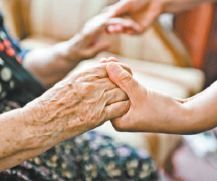AARP Hearing Center
The vast majority of older Americans want to live independently at home. In order to do so, they often rely exclusively on unpaid family caregivers for help. In Minnesota, more than 670,000 family caregivers are helping their loved ones live independently – keeping them in their homes and out of costly institutions, such as nursing homes. These unsung heroes provide unpaid care valued at about $8.2 billion annually.

As a state Minnesota can and should do more to support our family caregivers. That support starts with improving their access to training. Many family caregivers today perform a complex variety of caregiving duties despite an overall lack of training. These tasks include everything the basics like bathing, dressing and transportation to the very complex including medication management, injections, wound care, and more.
That’s why AARP is urging state lawmakers to enact The Caregiver Advise, Record, Enable (CARE) Act (HF 210/SF 107),to better support family caregivers as they safely help seniors stay at home.
What is The CARE Act?
- The CARE Act recognizes the critical role family caregivers play in keeping their loved ones out of costly institutions.
- The bill features three important provisions:
- The name of the family caregiver is recorded when a loved one is admitted into a hospital;
- The family caregiver is notified if the loved one is to be discharged to another facility or back home; and,
- The facility must provide an explanation and live instruction of the medical tasks – such as medication management, injections, wound care, and transfers – that the family caregiver will perform at home.
Why Minnesota Needs The CARE Act?
- Most care recipients (69%) * did not have a home visit by a health care professional after discharge from the hospital.
- Almost half (46%)* of family caregivers perform medical or nursing tasks for their loved ones with multiple chronic physical and cognitive conditions.
- Three out of four (78%)* who provide these medical or nursing tasks manage medications, including administering intravenous fluids and injections.
- Most family caregivers report that they received little or no training to perform these tasks.
Organizations That Support CARE Act (As of 1/15)
AARP, Alzheimer’s Association of Minnesota and North Dakota, American Cancer Society, American Heart Association, Amherst H. Wilder Foundation, Caregivers Creating Change, Family Means, National MS Society Upper Midwest Chapter, Open Arms Minnesota, University of Minnesota’s Center on Aging
For more information on the CARE Act, Contact Mary Jo George
*AARP report “Home Alone: Family Caregivers Provide Complex Chronic Care”































































